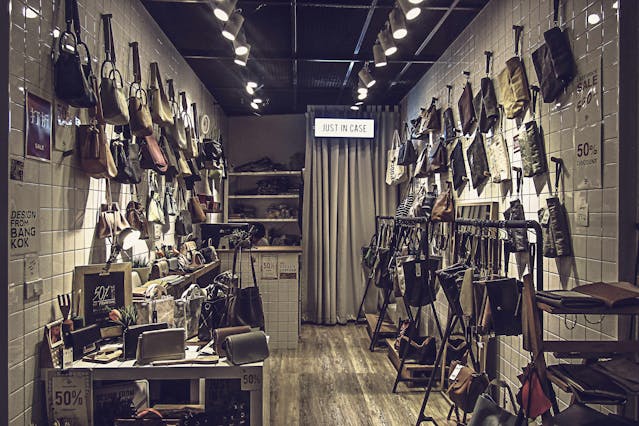We now live in a world of digital which means more shoppers are buying their items online. Technology has changed our lives and it has revolutionised the retail industry as well. The brick-and-mortar shopping experience seems to be becoming a thing of the past, with many major brands not recovering after COVID-19. However, those brands who have managed to stay open and compete with one another are changing their methods and modernising.
Retail shops are now using modern technology to help create a more personalised experience for their customers. Using AI technology, augmented reality and contactless payments, the future of retail is looking bright to compete with the online world of shoppers.
What Is The Technology Revolution In Retail?
For those who have grown up with technology, it is likely you have noticed the difference in how shops have changed. For those that were before the digital age, they will see that a lot has changed in the last 20-30 years when buying new clothes or products. For example, AI-powered chatbots have changed the way where a customer interacts with someone who works in the shop. These chatbots are advanced and feel like you are talking to a human. This could be anything such as finding out when an item is going to be restocked or how the clothing fits. It could also be a question on delivery time or refund policies. No matter what it is, we can guarantee that an AI-powered chatbot will be able to answer your queries.
Something else that has changed is AI algorithms that will suggest products based on a customer’s previous buys. Personalised shopping experiences like this are more likely to drive conversions, simply because the AI is picking items that are similar to the customer’s previously bought items. It isn’t just the conversion rate that this improves, it is also the customer’s loyalty to the brand.
As mentioned before, the traditional brick-and-mortar shopping experience is becoming far less common. That is due to the rise of mobile commerce. Now, a shopper is able to browse their favourite brands and retailers online and buy a product there and then. When using these apps, they are able to see suggested products and filter down the sizes, reducing the time of their shopping experience.
Although fewer people are shopping online, mobile commerce is also good for those bricks-and-mortar shopping experiences. For example, businesses can engage with their shoppers, by reaching out to local shoppers and offering them discounts at their stores. These discounts will often be for a limited time only but it does increase the footfall into these shops. A shopping centre in Leeds can reach out to people who have recently signed up for their newsletter, letting them know about sales in their shopping centre or even events. Or maybe, they are offering discounted parking in Leeds, making it more affordable for their shoppers.
Sustainability is also at the forefront of retail shops now and blockchain technology can be used to improve that. This is so it improves supply chain transparency and avoids counterfeit products. With the use of blockchain technology, retailing businesses can source where the product has come from and check the authenticity and quality of that product.
Finally, the internet is also creating smart stores which help to further that personalised shopping experience. Certain devices are capable of tracking stock levels and analysing a customer’s behaviour plus, they can send personalised offers to that specific customer.
The Negatives and Positives Of Retail Technology
Although technology is great for the industry, there are some disadvantages to it. Although an automated system can improve the shopper’s experience, it is essential they still have human interaction at some point in the customer journey. Yes, AI can provide personalised products to the customer, however, with a good experience with humans, a bond can be built between the customer and the brand, helping improve customer satisfaction and loyalty.
Data security is one of the bigger concerns with technology of this stature. Customer data is collected and therefore, retail companies will have to ensure that they have a good level of cyber security for their customers. They must protect them from any type of cybercrime. To do this, a high level of security must be in place with encryption protocols, regular vulnerability assessments, and improved data protection regulations. All of this must be done to ensure that they have the customer’s trust and loyalty.
Nonetheless, although there are some concerns with this technology, it provides a handful of opportunities with retailers, including improving sustainable practices. The use of RFID tags and a smart inventory management system to improve the logistics of AI-powered route planning means many retailers around the world can reduce their environmental impact. Sustainability can be a big selling point for a brand and it is at the forefront of many businesses. Not only will technology help attract customers for their sustainable practices but it will also help them save a lot of money.
What Does The Future Entail For Retail?
Virtual reality is also changing the retail industry. With the use of VR headsets, shoppers can step inside a virtual store. Here, they can interact with products and feel that shopping experience inside their homes. The positive of this is that retailers can still engage with customers, especially in the home decoration, travel and fashion industry.
There is also potential for drone deliveries. In the last 10 years, drone technology has improved significantly. With the use of drones, retailers can reduce delivery times significantly and overall, reduce costs. Next-day delivery can be taken to a whole new level with drone deliveries.
Blockchain technology is also going to be a massive factor in the retail industry. As mentioned earlier, it can help improve sustainable practices for companies and their production of items. Blockchain technology can offer more transparency with a product which will also help with more trust from customers. Furthermore, loyalty programmes can also be launched with customers and allow them to earn rewards for other retailers as well, this allows them to improve loyalty and engagement.
To Conclude
There is no doubt that the future of retail is rapidly changing and that is due to modern technology continuing to improve. Technology has also come a long way in the last 20 to 30 years and this has had an impact on many industries, not just retail. However, AI has improved the retail industry and we can only expect it to get better. It all started with contactless payments and being able to buy our clothing items online. Now, we are looking at a far more advanced future with retail and technology. Not just with retail but with everything else such as dental implants in Melbourne and exercising with the use of smartwatches.























